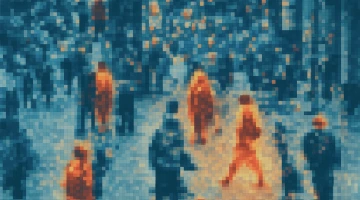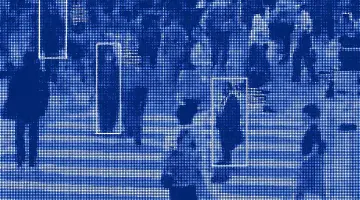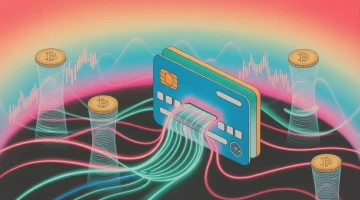Specifics of Smart Contract Development for DAO

Table of contents:
What is a DAO?
A Decentralized Autonomous Organization (DAO) is a revolutionary concept in the blockchain space that embodies true decentralization. Unlike traditional organizations where control is centralized in the hands of a few, DAOs are designed to distribute control among their members.
This model has gained significant traction in recent years, so more and more project founders set up DAOs to ensure true decentralization in their decentralized applications (dApps) like decentralized exchanges, marketplaces, lending and borrowing platforms, and even blockchain-based games.
This ensures that the application's management and decision-making processes are not governed by a central authority but by the collective voice of its community. The emergence of DAO development marks a critical shift toward empowering users and fostering transparent governance in the blockchain ecosystem.
The Role of Smart Contracts in DAO Development
At the heart of every DAO lies its smart contract – the backbone that defines the organization's rules and manages its treasury. Smart contracts are self-executing programs coded onto the blockchain, ensuring that the DAO operates exactly as intended without the need for human intervention. Once the smart contract is deployed, it becomes tamper-proof, meaning the rules can only be altered through a collective vote by the DAO's members.
This immutability is crucial for maintaining trust within the DAO. For example, if a decision needs to be made, such as allocating funds from the treasury, it must be approved by a majority vote. The smart contract automatically enforces this decision, preventing any unauthorized actions. This decentralized approach eliminates the need for a central authority, allowing the DAO to operate transparently and securely.
It's hard to overstate just how important smart contracts are to DAO development. They're the building block that lets DAOs work on their own, making sure that everything is transparent, secure, and in line with what the community wants. Smart contracts let DAOs truly decentralize, where every member has a voice and every decision is executed exactly as the community intends.
Whether you're looking to create a DAO smart contract for a new project or build DAO smart contract to enhance an existing application, understanding their pivotal role is key to unlocking the full potential of decentralized organizations.
DAO Smart Contracts vs. Traditional Smart Contracts
While all smart contracts share the common trait of being self-executing and immutable, DAO smart contract development differs significantly from traditional smart contracts in several key aspects:
Governance and Decision-Making
Traditional DeFi smart contracts are typically designed to execute specific tasks, such as transferring funds or completing a transaction, without any governance layer. In contrast, DAO smart contracts are inherently built to facilitate decentralized governance. They manage the decision-making process within the organization, enabling members to propose, vote on, and execute changes collectively. This governance framework is central to DAO smart contract development, ensuring that all decisions reflect the collective will of the community.
Complexity and Interconnectivity
Smart contract development for DAO is generally more complex than traditional smart contracts because they need to handle multiple interconnected processes, such as voting, proposal creation, fund management, and dispute resolution. These processes are often interdependent, requiring a robust and flexible architecture to manage the dynamic nature of a DAO. On the other hand, traditional smart contracts can vary in complexity but usually simpler, focusing on single-purpose tasks without the need for such comprehensive interconnectivity.
Community Involvement
DAO smart contracts facilitate direct community involvement in decision-making and governance. They often incorporate mechanisms like token-based voting or reputation systems. Traditional smart contracts, on the other hand, may not involve direct community participation, depending on the specific application.
Key Aspects of Smart Contract Development for DAO
Smart contract development for DAO involves several key aspects:
Decentralized Governance
The core of any DAO development is its decentralized governance model. DAOs rely on smart contracts to facilitate collective decision-making. These contracts encode the rules by which the organization operates, ensuring that every member has a say in its governance.
Autonomous Operation
Once deployed, DAO smart contracts operate autonomously, without any human input. This autonomy is really important for keeping the company's reputation and trustworthiness intact. For instance, if a proposal gets the thumbs-up in a majority vote, the smart contract will automatically execute, transferring funds or updating governance rules, and so on. That means the organization will function exactly as intended.
Token-Based Participation
Most DAOs operate using a token-based system, where members hold blockchain tokens that represent their voting power within the organization. Smart contract development for DAO helps to manage this token system, ensuring that voting is conducted fairly and transparently. The tokens can also represent stakes in the organization, aligning the interests of the members with the success of the DAO. This aspect of DAO smart contract development is critical for creating a fair and equitable governance structure.
Functions of Smart Contracts within DAOs
Smart contract development for DAO helps to manage a variety of processes that are essential for the organization’s operation and governance. These processes ensure that the DAO functions smoothly, transparently, and in alignment with its members' collective will:
Building the Proposal System
Submission and Voting: DAOs often have a system where members can submit proposals for consideration by the community. These proposals are then put to a vote, and the outcome determines whether the proposal is implemented.
Quorum Requirements: DAO smart contract development manages this process to ensure that decisions are made by a representative majority. DAOs may set quorum requirements, specifying the minimum number of votes needed for a proposal to pass. This system helps streamline decision-making and ensures that only relevant proposals are considered by the community.
Voting Mechanisms
Simple Voting: The most basic voting mechanism involves each member casting a single vote for or against a proposal.
Weighted Voting: In weighted voting, members may have different voting powers based on factors such as token holdings or reputation.
Quadratic Voting: Instead of each vote having equal weight, quadratic voting allows members to allocate multiple votes to issues they care more about, but at an increasing cost. This system, managed by DAO smart contracts, helps prevent the concentration of power and ensures a more democratic decision-making process.
Ranked Choice Voting: In this system, members rank proposals in order of preference. DAO smart contracts then calculate the winner based on these rankings, ensuring that the option with the broadest support wins. This voting method is particularly useful for making decisions where there are multiple viable options, as it ensures that the final choice has broad community backing.
Delegation of Voting Power
In larger DAOs, members might choose to delegate their voting power to trusted representatives. Smart contract development for DAO manages this delegation process, allowing members to assign their votes to others while retaining the ability to revoke this delegation at any time. This system enables more efficient decision-making while still allowing all members to have a say in the organization's governance.
Timelock Mechanism
The timelock mechanism is a critical feature in DAO smart contract development that ensures there is a delay between the approval of a proposal and its execution. This delay provides an opportunity for members to review the decision and, if necessary, challenge it. Timelocks are essential for maintaining the integrity of the DAO, as they prevent hasty or ill-considered decisions from being immediately implemented.
Challenging Proposals
Smart contract development for DAO typically includes mechanisms for challenging proposals that members believe are detrimental to the organization. If a proposal is challenged, the smart contract may require additional voting rounds or arbitration before it can be executed. This process helps protect the DAO from malicious or poorly conceived decisions, ensuring that all actions are in the best interest of the community.
Dispute Resolution
If there's a conflict or disagreement within the DAO, the smart contract may start a dispute resolution process, which could involve arbitration, mediation, or more voting rounds. This process makes sure that any disagreements are settled fairly and openly, maintaining harmony within the organization.
Treasury Management
Another important role of smart contract development for DAO is managing the organization's treasury. These contracts ensure that funds are only spent when authorized by the community through a vote. This prevents any individual or small group from unilaterally accessing the DAO's resources, so that all financial decisions are made with the collective will.
Each of these processes highlights the unique and intricate role that smart contracts play in DAO development. Whether you're looking to create a DAO smart contract or build DAO smart contracts with advanced governance features, understanding these processes is crucial for developing a robust and effective decentralized organization.
Process of Smart Contract Development for DAO
Creating a smart contract for a DAO is a structured process that requires strategic planning, technical proficiency, and a thorough understanding of decentralized governance. Here’s an outline of the key steps involved in building DAO smart contract from scratch:
1. Define the DAO’s Objectives
The first step in creating a DAO smart contract is to clearly define the DAO’s objectives.
- What purpose will the DAO serve?
- How will it operate?
- What kind of governance model will it use?
These questions need to be answered upfront, as they will shape the design and functionality of the smart contract. For example, a DAO focused on decentralized finance (DeFi) may prioritize security and fund management, while a DAO for a gaming community might focus more on voting mechanisms and member engagement. Defining these objectives is crucial, as they guide the development process and ensure that the DAO operates as intended.
2. Choose a DAO Smart Contract Development Company
Choosing the right DAO smart contract development company is a critical step. A specialist development company can provide all the technical know-how, expertise and experience needed to get the best from blockchain technology. They can walk you through the ins and outs of smart contract development for DAO, making sure the final product is secure, efficient, and in line with your goals.
Look for a company that offers comprehensive DAO smart contract development services, including custom development, security audits, and post-launch support.
3. Choose a Blockchain Platform
The next step is choosing a blockchain platform on which to deploy your DAO. The choice of platform will impact various aspects of the DAO, including transaction fees, scalability, and interoperability with other dApps.
Popular platforms for DAOs include Ethereum and BNB Chain, each offering different features and benefits. The platform you choose should align with your DAO’s objectives and technical requirements, such as the need for specific consensus mechanisms or smart contract functionalities. Your smart contract development company will help you to choose the best variant for your specific goals.
4. Design the DAO Smart Contract Architecture
Once the objectives are defined and a platform is chosen, the next step is designing the smart contract architecture. This involves mapping out the various components of the smart contract, including governance mechanisms, voting systems, and fund management processes. An important aspect of this phase is DAO tokenomics development, which defines how tokens will be created, distributed, and used within the DAO.
For example, MakerDAO, one of the most prominent DAOs, employs a dual-tokenomics model that has been one of the keys to its success. The system includes the Maker (MKR) token, which is used for governance, and the DAI stablecoin, which is pegged to the U.S. dollar. This tokenomics model ensures that the DAO operates smoothly and maintains stability, even in volatile markets.
5. Develop the DAO Smart Contract Code
With the architecture in place, the next step is to develop the smart contract code. This involves writing the actual code that will govern the DAO’s operations, including voting mechanisms, proposal management, dispute resolution mechanisms, fund allocation, and other functions.
Given the complexity and importance of DAO smart contracts, this step requires meticulous attention to detail. The code must be secure, efficient, and capable of handling all the scenarios defined in the design phase. Partnering with expert DAO smart contract developers ensures your smart contract’s code is secure and tamper-proof.
6. Test and Conduct a Security Audit
Before deploying the smart contract, it’s essential to conduct thorough testing and a security audit. Testing involves running the smart contract in various scenarios to ensure it behaves as expected. This includes testing the voting systems, fund management processes, and any other critical functionalities.
A security audit is equally important, as it identifies potential vulnerabilities in the code that could be exploited by malicious actors. Given that DAO smart contracts often control significant funds and governance rights, a rigorous audit is crucial to prevent security breaches and ensure the integrity of the DAO.
7. Deploy the DAO Smart Contract
Once the smart contract has been tested and audited, it’s ready for deployment. This step involves publishing the contract on the chosen blockchain platform, making it live and operational. Once deployed, the smart contract becomes immutable, meaning that its rules and functions cannot be changed without community consensus. This immutability is a cornerstone of DAO governance, ensuring that the organization operates transparently and according to its original design.
8. Integrate the Smart Contract with Your DAO's Frontend and Backend
After deployment, the smart contract needs to be integrated with the DAO's frontend and backend systems. This involves connecting the smart contract to the user interface (frontend) that members will interact with and ensuring that it communicates effectively with any backend systems, such as databases or external services.
9. Launch and Update the DAO
With everything in place, the final step is to officially launch the DAO. This involves making the DAO accessible to its members and allowing them to start participating in governance activities, such as submitting proposals and voting. After the launch, it's important to monitor the DAO's performance, gather feedback from the community, address any issues, and introduce new features.
Choosing a DAO smart contract development company ensures that all these steps are handled by experts who understand the intricacies of decentralized governance. A robust company will provide the technical expertise and support you need for a successful launch.
How Rock'n'Block Can Help You with DAO Smart Contract Development
At Rock'n'Block, we specialize in DAO development services, including DAO smart contract development. We provide comprehensive solutions tailored to your organization's unique needs. Our team of experienced developers and blockchain experts has a deep understanding of the intricacies of DAO governance, tokenomics, and smart contract design.
A Bit About Our Expertise:
- Custom Smart Contract Development: We create bespoke smart contracts that align with your DAO's specific goals and objectives, ensuring optimal functionality and security.
- Blockchain Platform Expertise: Our expertise spans various blockchain platforms, including Ethereum, BNB Chain, Tron, Polygon, TON, and others. This allows us to select the most suitable platform for your DAO based on your requirements and preferences.
- Comprehensive Development Services: We offer a full range of DAO smart contract development services, from initial consultation and design to deployment and ongoing maintenance.
- Security and Auditing: We prioritize security and conduct thorough audits of our smart contracts to identify and mitigate potential vulnerabilities.
- Blockchain Consulting: Our team provides expert blockchain consulting services to help you navigate the complexities of the blockchain landscape and ensure that your project is on the right track.
Why Choose Rock'n'Block?
- Proven Expertise: Our track record of successful DAO smart contract development for a wide range of blockchain projects speaks for itself.
- Custom Solutions: We make sure our solutions fit your needs perfectly, so your DAO can run smoothly and efficiently.
- Security and Trust: We prioritize security and transparency, building trust with our clients.
- Client-Centric Approach: We work closely with our clients to understand their goals and deliver exceptional results.
Contact us today to discuss your project and learn how we can help you build a successful DAO!
We ❤️ Development
Follow us on social media to receive the hottest blockchain development updates












%201.webp)



